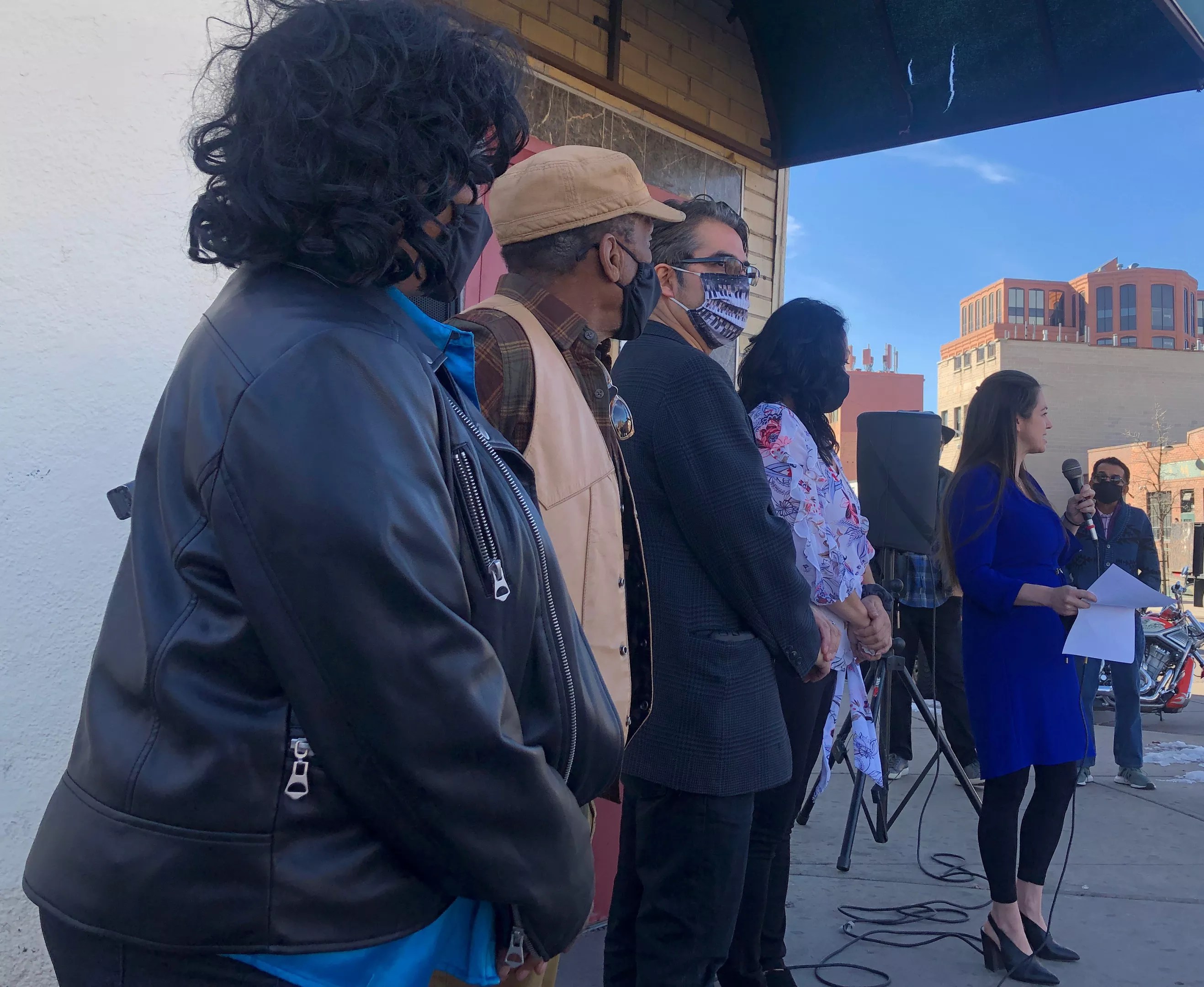
Jon Solomon

Audio By Carbonatix
While El Chapultepec had to close under Colorado’s Level Red COVID-19 restrictions, the pandemic isn’t the only reason the owners are putting the legendary Denver jazz club to rest after nearly nine decades.
Even so, plenty of people were quick to jump to conclusions after rumors of the club’s closure surfaced a few days ago. Some blamed the state-imposed shutdown, while others argued that the federal government has been too slow to pass new relief bills.
But the reasons why El Chapultepec is finished aren’t that simple.
“I want to make sure we’re not going to be too quick to point the finger at COVID and our [government] shutdowns for being the reason for this closure,” said Anna Diaz, speaking at a December 8 press conference outside the club. She has owned the business with her sister, Angela Guerrero, since the two inherited it from their father, Jerry Krantz, who operated the club from 1968 (he inherited it from his father-in-law, Tony Romano) until he died in 2012. “Of course, the closure played a part in it. Undoubtedly, that makes an impact in our decision, but there are so many things that led to this choice.”
Drunken Rockies fans disrupting shows, Denver’s explosive growth, and safety issues also led them to shut down the Pec, a nickname coined by saxophonist Freddy Rodriguez Sr., who headed up house bands at the club for four decades before he passed away last March.
“Jazz musicians and blues musicians, they shouldn’t have to time their sets around the baseball innings and when the crowd is going to get out and be wild,” she added. “They should be able to play their music, and the crowd [should] just be there to enjoy them. And that’s been really difficult to manage, and we’ve been doing it a long time.”
The club’s employees, musicians and customers also shouldn’t have to worry about safety when leaving, Diaz added, “whether it’s the tent city or the drunken mobs that are pouring out onto Market Street at two o’clock. It’s just really taking a toll on us, and it’s just that Denver’s different than it used to be, and 20th and Market is different than it used to be.”
While many longtime patrons and musicians have proposed bailing out the club through donations or buying it outright, Diaz says that’s not an option – though she appreciates the offers.
“We just want to really be clear about a few things. One: The Pec is not for sale,” she said. “The business is not for sale. We’re not interested in selling, and the decision is final. There’s not going to be a GoFundMe that’s going to reverse our choice. So we just want to be clear about that. The Pec is a living, breathing part of Denver, and especially a part of our family. And it’s very intimate to us, and we’re just ready to close that chapter and keep it with us, ultimately.”
As for the sale of the building, that’s not up to the sisters, since they don’t own it. Evan Makovsky, co-owner of Shames Makovsky Realty Company, bought the building at 1962 Market Street after Krantz died so that his family could continue to run the club there. He’s not yet ready to discuss future plans, he says.
But don’t expect condos anytime soon, either. The building is part of the LoDo Historic District, which will offer it some protection from development.
As for the club, “it has to be something that’s meaningful,” said Diaz. “And unfortunately, Denver’s outgrown us.”

Anna Diaz speaks at a press conference about the closure of El Chapultepec.
Jon Solomon
At the press conference, Carlos Lando, general manager of jazz station KUVO, talked about how Krantz welcomed anyone into the club, whether it was someone off the streets or a stranger in town for a business meeting.
“If you had enough money to buy a beer and you wanted to enjoy some music, you were welcome,” Lando said. “And you’ll be in there rubbing elbows with the mayor, with a senator, with a famous musician or a famous celebrity movie star – whatever. This was the place where everybody came to let their hair down and unwind and be part of a scene. … Your stature or how much money you had or if you didn’t have money, you were all there. And it was all because of the culture that Jerry Krantz established.”
Lando said KUVO broadcast nearly a hundred shows from the second booth of the Pec between 1992 and the end of 1994. Once things settle down and KUVO moves into its new home at the Buell Public Media Center, he’d like to see some of the station’s staff sift through its massive archive of music recorded in Colorado over the past three decades. “A big part of that was El Chapultepec,” Lando said. “We’re hoping that we can develop some kind of a show or platform on one of our digital streams or even on the air to…bring you some wonderful music from the heyday of El Chapultepec.”
Guerrero, who ran the club after Krantz died, thanked everyone who supported El Chapultepec over the years.
“It was greatly appreciated,” she said. “A lot of the people that have been coming here are part of our family, because they’ve been coming here ever since we were kids. So we’ve grown up with all the customers that have been coming in here. Thank you for all the years of support, and continue to support live music. … There’s still venues out there, and we can keep all these great Colorado musicians playing.”